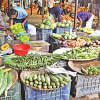Sustenance, soaring prices, and struggling students

Each day seems to arrive bearing updates on inflation and food insecurity. The air is thick with the strain, particularly among those for whom meals have become an unpredictable luxury. In Bangladesh, the World Food Program (WFP) reported in August that a staggering 38 percent of low-income households grappled with food insecurity, even as prices briefly dipped when the interim government took office.
As a public university student, I am no stranger to the diverse backgrounds of my fellow students. Some, who live with their families, have to put up with the economic turmoil. Others, however, who live away from home face the brunt of rising commodities all by themselves and are forced to make tough calls when shopping for groceries. Figuring out one's daily needs requires asking uncompromising questions: How many packets of noodles are required for a dozen eggs? How many cups of tea does one forgo for tomorrow's meal?
Khingmokay Marma, a fourth-year student at Dhaka University (DU) living in an off-campus hostel, describes narrowing down her shopping list, cutting one item after another to stay within budget. She says, "With market costs climbing, those of us in hostels or shared lodgings have to stretch our budgets just to manage," she explains. "At the market, you see that everything's price has gone up, and I can't just swap one item for another. We always have to sacrifice something to meet our fixed budgets. If I want fish or meat, I must do without vegetables; if I want vegetables, then the other two are off the table."
She, along with numerous other students, must balance the cost of living with their limited resources.
In conversation with students, a recurring theme surfaced: the steady, reluctant cutting down of food essentials. Syed Musaddekun Nobi, a DU student, prepares his meals in the cramped quarters of his Kabi Jasim Uddin Hall dorm room, yet even this simple ritual is slowly becoming a luxury. Vegetables, once a staple, are now a costly burden.
"The price of vegetables fluctuates so much that even buying them has become a challenge," he says. "Preparing vegetables isn't like preparing fish or poultry – you need a mix of other ingredients to make a proper dish. But going to the market and picking up cauliflower, potatoes, beans, and tomatoes – all of it quickly adds up. Sometimes, it's nearly as expensive as buying chicken."
For students on a tight budget, nutrition has become a delicate balancing act; a predicament where even basic produce feels like an indulgence.
Ummul Wara Zinatunnesa, a student at Rajshahi University of Engineering and Technology (RUET), recounts how a mere 500 BDT no longer stretches to cover the weekly market run. "The prices have been high since before August. We thought the price increase might ease when the government changed; instead, they've climbed," she says, with a weary resignation. "When you take Tk 500 to the market, the food you get barely lasts for two or three days, whereas it used to last for a week. The cost of staples like beans and cauliflower has soared, even as winter, typically a season for abundance, approaches," she adds. "While fruits alone can't meet your nutrition needs, they are still important. However, apples, tangerines, and oranges are all out of reach. So, I'm left with only rice and eggs. Nutrition has become a luxury, and there's nothing to be done about it."
Tahmina Nowreen*, a Khulna University (KU) student who has lived off-campus for two years, describes the strain of keeping up with rising expenses. "My only source of money is my tuition," she says, adding that she avoids turning to her parents for financial support. "With so little to rely on, keeping up with grocery prices feels impossible. Sometimes, I eat just to feel full – I don't even think about nutritional value."
For many students on a tight budget, meals become purely practical, devoid of any consideration for nutrition or quality, as their focus shifts from what they're eating to ensuring they at least have something on their plates.
According to another report by the WFP, "Food Security and Livelihood Monitoring," nearly one-third of households reported that they simply didn't have enough food. The situation worsens for low-income households, with six out of 10 reporting insufficient food – a staggering statistic.
The desire for nutritious meals should not be a luxury. It is a necessity, even as students across Bangladesh grapple with a merciless economy that has left them struggling from one meagre shopping run to the next. Subsistence meals cannot sustain the resilience required by young minds balancing ambition and academia. If these minds are the foundation of the nation's future, they must have bodies that are strong enough to support them. It is time for institutions, government agencies, and lawmakers to look beyond the numbers and see the faces of these young people who require more than just an education; they require the means to thrive.
*Name has been changed upon request.
Azra Humayra is majoring in Mass Communication and Journalism at the University of Dhaka.
Reference:
The Daily Star (September 28, 2024). কম আয়ের প্রতি ১০ পরিবারের ৬টি পুষ্টি চাহিদা মেটাতে হিমশিম খাচ্ছে.

 For all latest news, follow The Daily Star's Google News channel.
For all latest news, follow The Daily Star's Google News channel. 










Comments